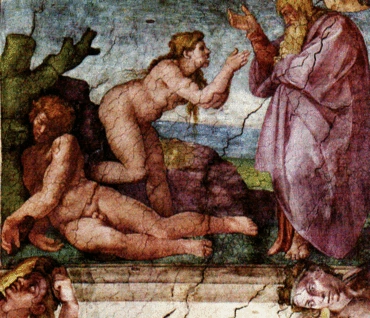Explanation of Genesis 2:21
Napsal(a) Brian David

Sleeping in the Bible represents a state of spiritual obscurity, in which we are distanced from the Lord and are not aware of His love and His wisdom. The Lord put the people of the Most Ancient Church (Adam) into such a state of obscurity (sleep) because they wanted to live from themselves. And in a way, humanity has been asleep ever since, unaware that our thoughts, our feelings, our very life and love flow into us from the Lord, and are not our own.
But the Lord would let Adam carry on. He took a part of him that was least alive – meaning the least receptive of the Lord, since the Lord is life – and prepared to make a new person that would give Adam the life he wanted. The people of the Most Ancient Church would be cut off from direct communication with the Lord and with heaven, but would instead – through the nearly lifeless bit of humanity represented by the rib – be able to experience life as their own.
(Odkazy: Arcana Coelestia 147, 148-151)
Arcana Coelestia # 3538
3538. 'Which were with her in the house' means which come from Divine Good by way of the Divine Truth of the Divine Rational. This is clear from the representation of Rebekah, to whom the pronoun 'her' refers here, as the Divine Truth of the Divine Rational, dealt with already, and from the meaning of 'the house' as Divine Good in this instance because it has reference to the Lord. As regards 'house' meaning good, see 710, 2233, 2234, 2559, 3128. The reason why these considerations are meant by the words 'which were with her in the house' is that 'the house' means the rational both as regards good and as regards truth, or what amounts to the same, as regards both the will part of the mind, the dwelling-place of good, and the understanding part, the dwelling-place of truth. When the rational functions from the will or from good, by way of the understanding or of truth, the rational mind in that case is called 'one house'. This also is why heaven itself is called 'the house of God', for heaven consists of nothing else than good and truth, with good functioning through truth united or joined to itself. This is also represented in marriages in which husband and wife constitute one house, the reason being that conjugial love originates in the Divine marriage of good and truth, 2728, 2729, 3132, and forms the will of the two of them by virtue of good. There is a difference however, which is like the relationship of good to its own truth. Consequently 'husband' also means good and 'wife' truth. For when the house is one, good is in that case the all in it, and truth, being wedded to good, is good as well. The reason why the phrase 'with her in the house' is used, and not with him or with them, is that the subject is the state of conjunction of truth and good, that is, the state prior to their being fully united or joined together. This state is dealt with next.






